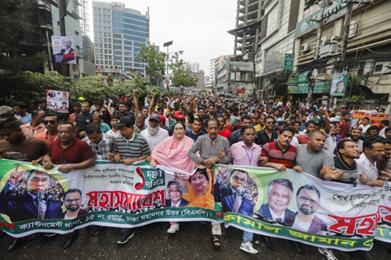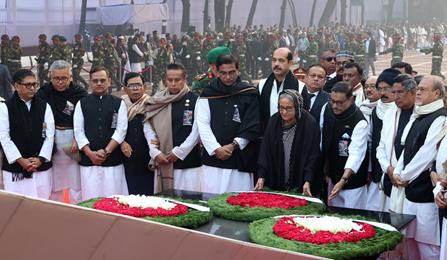Bangladesh’s Upcoming Election and the Awami League’s Prolonged Rule: Balancing Continuity and Accountability
The Awami League government will lead the upcoming election, causing controversy as several political groups, including the BNP, have declined to participate.
Dhaka, Bangladesh – December 16, 2023 – Bangladesh is gearing up for another national election, which is set to take place on January 7 next year. This election will be conducted under the leadership of the Awami League-led government. This event has sparked controversy as several political parties, notably the BNP, have chosen not to participate. Like any political entity, the Awami League’s policies and actions have faced criticism and ignited debates. The Awami League has been in uninterrupted power for 14 years, during which it has achieved significant developmental milestones for the nation. However, this prolonged rule raises questions about the potential consequences of a continuous one-party government.
which is set to take place on January 7 next year. This election will be conducted under the leadership of the Awami League-led government. This event has sparked controversy as several political parties, notably the BNP, have chosen not to participate. Like any political entity, the Awami League’s policies and actions have faced criticism and ignited debates. The Awami League has been in uninterrupted power for 14 years, during which it has achieved significant developmental milestones for the nation. However, this prolonged rule raises questions about the potential consequences of a continuous one-party government.
The BNP’s movement for a caretaker government to oversee national elections has yet to gain traction despite its efforts through strikes and blockades. These actions have been met with disapproval from the general population, leading to the conclusion that the Awami League-led government will indeed hold the upcoming elections as scheduled. If the Awami League secures a majority in the polls, it will further extend its rule, raising concerns about the sustainability of one-party governance in Bangladesh.
The Awami League holds historical significance in Bangladesh as it played a pivotal role in the country’s struggle for independence from Pakistan in 1971, under the esteemed leadership of the Father of the Nation, Bangabandhu Sheikh Mujibur Rahman.
The impact of a single political party ruling a country for an extended period is complex, with both positive and negative consequences. While it can bring stability, policy consistency, and infrastructure development, it also poses risks of authoritarianism, corruption, and a lack of political dynamism. Striking a balance between continuity and accountability is crucial for the sustained well-being of a nation under such governance.
Numerous global examples highlight the challenges and benefits of prolonged one-party rule. In Zimbabwe, the rule of Robert Mugabe was marred by allegations of authoritarianism and human rights abuses. Venezuela faced democracy erosion under the United Socialist Party, leading to political polarization and economic struggles. Prolonged one-party rule can also breed corruption and nepotism in certain African nations.
However, not all cases are negative. China’s Communist Party, for instance, has maintained stability and continuity in governance for several decades, fostering economic growth and development. Similarly, Singapore’s People’s Action Party (PAP) has been in power since the 1950s and is credited with transforming the nation into a modern city-state with robust infrastructure. These examples show that long-standing single-party systems can facilitate quicker decision-making, enabling prompt responses to economic or social challenges.
 Bangladesh’s political landscape has been marked by multiple political parties and dictators since its independence. After the assassination of Bangabandhu Sheikh Mujibur Rahman in 1975, his daughter, Sheikh Hasina, has served numerous terms as Prime Minister, playing a pivotal role in the nation’s politics and geopolitical affairs. Since the restoration of democracy in 1991, the Awami League has predominantly held power, forming parliamentary governments without interruption since the 2008 election, effectively establishing a one-party rule within a democratic system.
Bangladesh’s political landscape has been marked by multiple political parties and dictators since its independence. After the assassination of Bangabandhu Sheikh Mujibur Rahman in 1975, his daughter, Sheikh Hasina, has served numerous terms as Prime Minister, playing a pivotal role in the nation’s politics and geopolitical affairs. Since the restoration of democracy in 1991, the Awami League has predominantly held power, forming parliamentary governments without interruption since the 2008 election, effectively establishing a one-party rule within a democratic system.
The Awami League-led government has consistently emphasized the twin pillars of democracy and development, echoing the vision of Bangabandhu to build a prosperous “Sonar Bangla” (Golden Bangla). It prioritized economic growth and social welfare through various economic reforms and development projects during its tenure. The party’s approach to governance has been marked by secularism and inclusivity, promoting cultural diversity and religious harmony.
The Awami League has historically enjoyed widespread popularity, winning many seats in the 1954 and 1971 elections and facing opposition from other political parties.
A study conducted in 2023 highlights the importance of Sheikh Hasina’s return to Bangladesh in 1981, marking a pivotal moment in the nation’s history of democracy and development. Her leadership and the subsequent democratic movements compelled a military dictator to hand over power to a caretaker government for the parliamentary elections. In her fourth term as Prime Minister, Sheikh Hasina has steered the country towards becoming a role model for development worldwide. Bangladesh now boasts a remarkable story of growth and development, aspiring to achieve upper-middle-income status by 2031, thanks to her visionary leadership and unwavering commitment to fulfilling the dream of Father of the Nation Bangabandhu Sheikh Mujibur Rahman. Sheikh Hasina’s determination is driven by a genuine concern for the welfare of her people rather than personal gain, to make Bangladesh “Sonar Bangla” by 2041.
